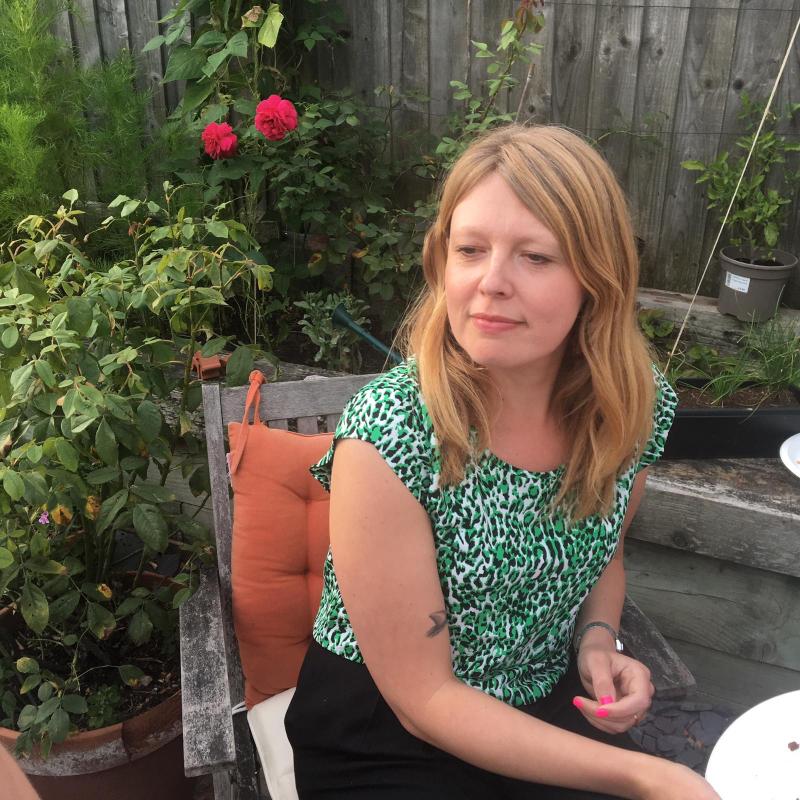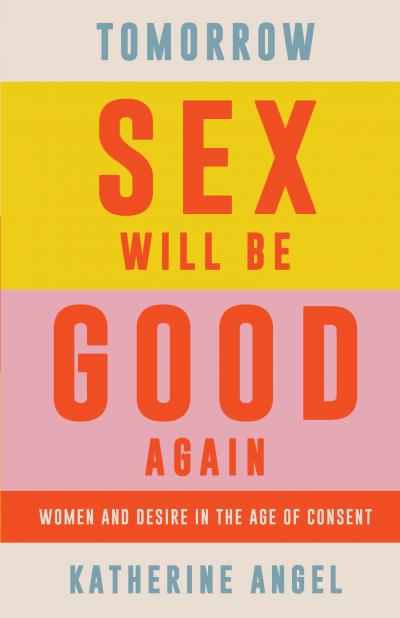Katherine Angel: Tomorrow Sex Will Be Good Again review – the complexities of consent | reviews, news & interviews
Katherine Angel: Tomorrow Sex Will Be Good Again review – the complexities of consent
Katherine Angel: Tomorrow Sex Will Be Good Again review – the complexities of consent
Consent as a binary cannot be everything we want it to be

Katherine Angel borrows the title of her latest book, Tomorrow Sex Will Be Good Again, from an essay by Foucault.
Angel is an academic at Birkbeck with a PhD in the history of psychiatry and sexuality. Her previous books, Daddy Issues and Unmastered: A Book on Desire, Most Difficult to Tell deal respectively in fathers in contemporary culture and in her own experience of desire as a woman. In her third book, Angel continues her focus on the experience of women and the power dynamics of hetero cis relationships, explicitly leaving it to others to explore the dynamics of queer and trans sex. This acknowledgement that a single text cannot cover everything is perhaps indicative of her argument in Tomorrow, where she navigates a difficult argument that the binary governing consent has its weaknesses.
 Though consent is clearly necessary and, as she puts it, “the least bad standard for sexual assault law”, there are problems with it. One such issue is that consent “privileges a robust self-knowledge about desire”. It demands self-assertion by women and a self-awareness that, paradoxically, women are often criticised for in the workplace and elsewhere. Thus, a conventional understanding of consent relies on speaking out, privileging women who are able to “perform a confident sexual self”. If we want sex to be good again, we need to reject the idea of self-knowledge as the be-all and end-all, separating out the idea of affirmative consent from sexual confidence.
Though consent is clearly necessary and, as she puts it, “the least bad standard for sexual assault law”, there are problems with it. One such issue is that consent “privileges a robust self-knowledge about desire”. It demands self-assertion by women and a self-awareness that, paradoxically, women are often criticised for in the workplace and elsewhere. Thus, a conventional understanding of consent relies on speaking out, privileging women who are able to “perform a confident sexual self”. If we want sex to be good again, we need to reject the idea of self-knowledge as the be-all and end-all, separating out the idea of affirmative consent from sexual confidence.
Supplementing this full-bodied analysis of consent’s weaknesses, Angel charts us through the notions of “desire”, “arousal” and “vulnerability”. We must, she argues, read bodies from the outside in, rather than from the inside out. This involves a close unpicking of the assumed evolutionary basis of male versus female desire, and a rereading of physical bodies as not necessarily explicit manifestations of internal impulses. Just because a woman’s body seems to indicate arousal, arousal should not be assumed without listening to what women say. These chapters raise the difficulty of communicating what we want in a cultural and physical language so shaped by years of assumptions about women’s desires.
Changing the discourses that write the female body does not mean a complete dismissal of consent – indeed, it would be very difficult for Angel to justify this. Rather, she tries to widen its remit, reducing the pressure on consent as a guarantor for good sex. Instead, we should turn to “conversation, mutual exploration, curiosity, uncertainty”. This change is at the heart of Angel’s argument, although it is sometimes difficult to reconcile with the fact that consent has to be clear. Angel writes in her final chapter: “Asserting one’s boundaries – stating what one will and won’t do – may be an important ground for the possibility of pleasure in the first place.” But how are we to assert boundaries in a conclusive way while eschewing consent’s “conceit of absolute clarity”?
Her thesis seemed a little contradictory at this point, but the distinction may lie in the difference between knowing what you want before sex and knowing what you want during it. Working out and attempting to speak our desires in the process of exploration means self-knowledge emerges through trial and error rather than being “robustly presumed” in the first place. There is no presumption that a woman must know her own desire from the outset, although clarity is likely to be required at some stage or other. This also retains the “vulnerability” that Angel argues is inherent to the joy and magic of sex. Since part of what is good about sex is losing one’s self to another, setting boundaries as one goes along makes more sense than binding oneself to a foregone conclusion via a single word. This ties in with the argument that consent should be ongoing, but Angel extends her focus beyond that: consent, she argues, should be extended into varieties of speech, not compartmentalised into one confident affirmative we may never be able to achieve.
What Angel seems to indicate, then, is that good sex means we should make “conversation, mutual exploration, curiosity, uncertainty” more like consent. She is right – consent as a “yes”/“no” dichotomy cannot be everything we want it to be. We must recognise that language cannot say everything, especially for women, who have not historically been given the chance to shape it according to their own needs and desires. Instead, we can try to speak in a half-language of desire, in unfinished words, and keep on attempting to work out what we want.
It is a nebulous alternative to the binaries of consent, and acknowledges the risk of not being understood, or of being wilfully misunderstood, when it comes to sexual relations. But Angel’s point is that this risk never goes away; desire is inherently unstable. But instability does not have to mean subjugation, and if we look around us at medial and cultural portrayals of female desire, it is clear that women are too often told what they want. Precisely because we have not yet (will perhaps never) reach the pinnacle of perfect representation, notions of consent should continue to change and develop.
The best way to deal with this is to stretch out consent temporally and linguistically, acknowledging that it will be part of the same process as exploring desire, instead of occurring prior to that experience. There should be many moments to say yes or no, not just one. As much as consent is an absolute, it is also a process to be individually navigated.
- Tomorrow Sex Will Be Good Again by Katherine Angel (Verso Books, £10.99)
- Read more book reviews and features on theartsdesk
The future of Arts Journalism
You can stop theartsdesk.com closing!
We urgently need financing to survive. Our fundraising drive has thus far raised £49,000 but we need to reach £100,000 or we will be forced to close. Please contribute here: https://gofund.me/c3f6033d
And if you can forward this information to anyone who might assist, we’d be grateful.

Subscribe to theartsdesk.com
Thank you for continuing to read our work on theartsdesk.com. For unlimited access to every article in its entirety, including our archive of more than 15,000 pieces, we're asking for £5 per month or £40 per year. We feel it's a very good deal, and hope you do too.
To take a subscription now simply click here.
And if you're looking for that extra gift for a friend or family member, why not treat them to a theartsdesk.com gift subscription?
more Books
 'We are bowled over!' Thank you for your messages of love and support
Much-appreciated words of commendation from readers and the cultural community
'We are bowled over!' Thank you for your messages of love and support
Much-appreciated words of commendation from readers and the cultural community
 Robin Holloway: Music's Odyssey review - lessons in composition
Broad and idiosyncratic survey of classical music is insightful but slightly indigestible
Robin Holloway: Music's Odyssey review - lessons in composition
Broad and idiosyncratic survey of classical music is insightful but slightly indigestible
 Thomas Pynchon - Shadow Ticket review - pulp diction
Thomas Pynchon's latest (and possibly last) book is fun - for a while
Thomas Pynchon - Shadow Ticket review - pulp diction
Thomas Pynchon's latest (and possibly last) book is fun - for a while
 Justin Lewis: Into the Groove review - fun and fact-filled trip through Eighties pop
Month by month journey through a decade gives insights into ordinary people’s lives
Justin Lewis: Into the Groove review - fun and fact-filled trip through Eighties pop
Month by month journey through a decade gives insights into ordinary people’s lives
 Joanna Pocock: Greyhound review - on the road again
A writer retraces her steps to furrow a deeper path through modern America
Joanna Pocock: Greyhound review - on the road again
A writer retraces her steps to furrow a deeper path through modern America
 Mark Hussey: Mrs Dalloway - Biography of a Novel review - echoes across crises
On the centenary of the work's publication an insightful book shows its prescience
Mark Hussey: Mrs Dalloway - Biography of a Novel review - echoes across crises
On the centenary of the work's publication an insightful book shows its prescience
 Frances Wilson: Electric Spark - The Enigma of Muriel Spark review - the matter of fact
Frances Wilson employs her full artistic power to keep pace with Spark’s fantastic and fugitive life
Frances Wilson: Electric Spark - The Enigma of Muriel Spark review - the matter of fact
Frances Wilson employs her full artistic power to keep pace with Spark’s fantastic and fugitive life
 Elizabeth Alker: Everything We Do is Music review - Prokofiev goes pop
A compelling journey into a surprising musical kinship
Elizabeth Alker: Everything We Do is Music review - Prokofiev goes pop
A compelling journey into a surprising musical kinship
 Natalia Ginzburg: The City and the House review - a dying art
Dick Davis renders this analogue love-letter in polyphonic English
Natalia Ginzburg: The City and the House review - a dying art
Dick Davis renders this analogue love-letter in polyphonic English
 Tom Raworth: Cancer review - truthfulness
A 'lost' book reconfirms Raworth’s legacy as one of the great lyric poets
Tom Raworth: Cancer review - truthfulness
A 'lost' book reconfirms Raworth’s legacy as one of the great lyric poets
 Ian Leslie: John and Paul - A Love Story in Songs review - help!
Ian Leslie loses himself in amateur psychology, and fatally misreads The Beatles
Ian Leslie: John and Paul - A Love Story in Songs review - help!
Ian Leslie loses himself in amateur psychology, and fatally misreads The Beatles
 Samuel Arbesman: The Magic of Code review - the spark ages
A wide-eyed take on our digital world can’t quite dispel the dangers
Samuel Arbesman: The Magic of Code review - the spark ages
A wide-eyed take on our digital world can’t quite dispel the dangers

Add comment